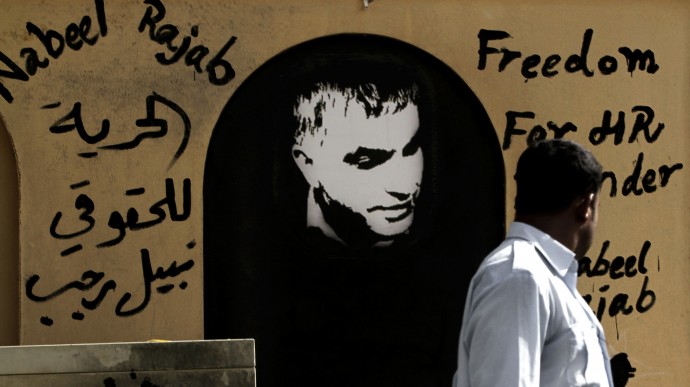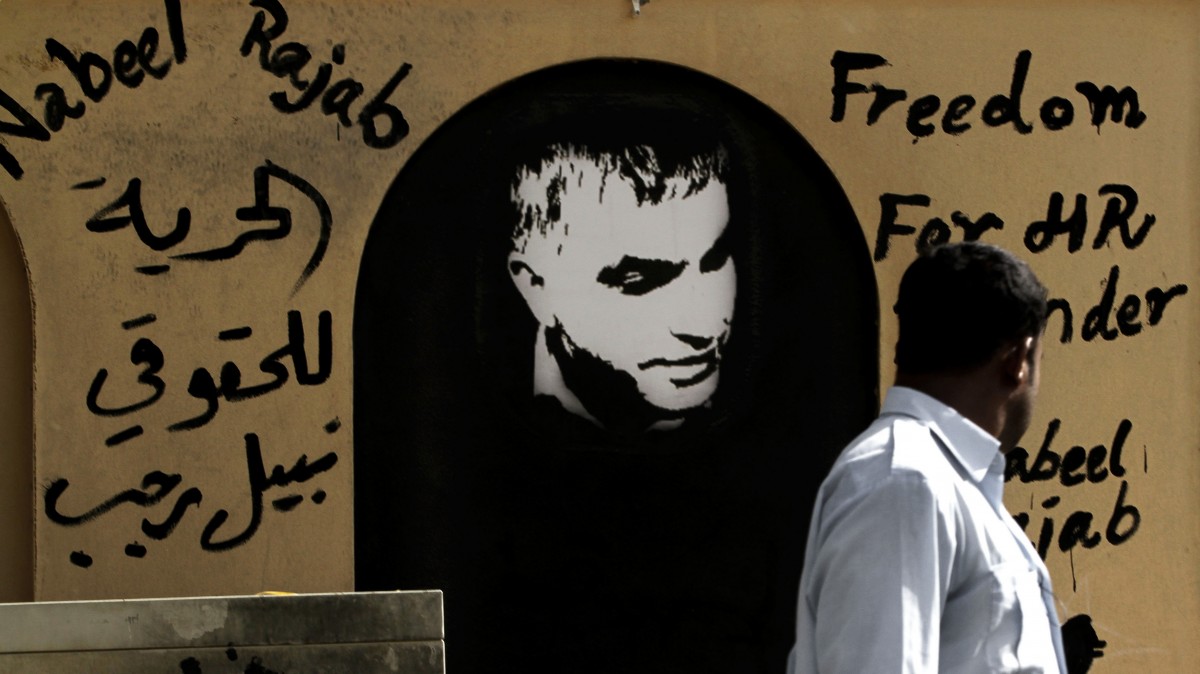
(MintPress) — Nabeel Rajab, activist and director of the Bahrain Center for Human Rights, was sentenced by a Bahraini court to three years in prison last week for organizing and participating in “illegal gatherings.” These gatherings have been mostly peaceful demonstrations by Bahraini citizens, demanding democratic reforms and greater accountability from their government.
A separate three-month sentence against the prominent human rights advocate was dropped on Thursday after Bahraini judicial authorities said there was “uncertainty regarding the evidence submitted to support the lawsuit.” Rajab had been charged earlier this summer with making “anti-government” statements on his Twitter account. Although supporters welcomed the dismissal, Rajab remains in prison on charges of organizing and participating in illegal gatherings.
In response to Nabeel’s continued incarceration, 19 U.S. congressmen wrote a letter urging Bahrain’s King Hamad bin Isa Al Khalifah to free the activist and other political dissidents held in the small Gulf Kingdom. While human rights organizations both in Bahrain and the U.S. have praised the move, few in Washington have considered suspending the multi-million dollar arms deal with Manama despite ample evidence suggesting U.S. weapons have been used to kill protesters and subdue peaceful protests.
Congressional support
Since the beginning of the conflict 18 months ago, the government crackdown in Bahrain has killed nearly 100 and injured scores more in the ongoing uprising. The conflict, while largely overshadowed by the brutal civil war in Syria, remains a pivotal Arab Spring uprising, at times drawing nearly 150,000 protesters in a country with a population of just over 1 million.
Much of the U.S. support for the Bahraini government stems from Washington’s close alliance of convenience with a regime allowing U.S. troops to be stationed in Manama, in close proximity to Iran.
Nabeel’s incarceration is one that struck a chord with Congressman Keith Ellison (D-Minn.), an advocate of human rights and one of the letter’s co-author’s. Ellison commented on the purpose of the congressional appeal in a recent MintPress statement, saying:
“After today’s ruling nobody can say that there is freedom of expression in Bahrain. Nabeel didn’t advocate or participate in violence. Because he disagreed with the government, they threw him in jail, they threw the book at him. This is the same guy that had been sentenced to three months for tweeting. This is just outrageous to me. The government of Bahrain must enact political and human rights reforms.”
Ellison, like many advocating for Nabeel’s release, believes it is his duty to speak out, not just as an elected official, but as a concerned member of the international community.
“I don’t believe that the U.S. has any special role to push Bahrain to do this or that. I am speaking as a member of the international community who will stand up for human rights, no matter where the violation takes place; inside the U.S., out of the U.S., in Bahrain, not in Bahrain,” Ellison added.
The letter is an important effort to draw international attention to the grave situation in Bahrain; a conflict that is often underreported in part because of heightened regional fears of an Israeli strike against Iranian nuclear facilities before the U.S. presidential election this November. Bahrain, much like other Arab Gulf states, remains closely allied with the U.S. on military and economic matters.
Support from the activist community
Before his case received congressional support, Rajab enjoyed support from democracy activists in the international community. His plight, like so many protest leaders, is as seen emblematic of the political changes demonstrators have been fighting for across Bahrain. Rajab was interviewed by WikiLeaks founder Julian Assange earlier this summer on the Russia Today show, “The World Tomorrow.”
During the interview, Rajab commented on the struggle to create democratic change, saying, “This is the struggle, this is freedom and democracy that we are fighting for and it has a cost. We have to pay the cost and the cost might be very expensive as we have paid high costs in Bahrain. We are willing to pay that for the changes that what we are fighting for.”
Assange, who is currently facing his own extradition battle against the U.S., has previously expressed support for Nabeel Rajab and other protesters in the Bahraini uprising. Some of the protesters have resorted to more dramatic tactics, including hunger striking, as a means to protest continued authoritarian rule.
Adding to the list activists fighting for freedom, Bahraini activist Abdulhadi al-Khawaja took part in a 110 day hunger strike earlier this year to draw attention to the government crackdown in Bahrain. Khawaja abandoned the strike in May at the insistence of family members concerned about his deteriorating health condition.
The sacrifices of Rajab, Khawaja and many others have not yielded significant political reform. However, the authors of the congressional letter praised the monarchy for “positive developments” while urging King Hamad bin Isa Al Khalifah to enact further reform.
These “positive developments” were promises made by the Bahraini monarchy to respect protesters’ will to assemble and protest peacefully.
“‘The Bahraini government said they are going to observe human rights. They said that, and thats good. But thats just declaring your position, now you have to implement that. I am concerned because this latest thing is damaging Bahrain’s image in the world,” added Congressman Ellison.
Arms trading with human rights violators
The letter, while drawing public attention to an important issue could be bolstered should the U.S. decided to suspend arms sales to Bahrain. The Obama administration briefly suspended a $53 million arms deal to Bahrain last year to investigate human rights abuses.
The investigation came partly in response to a report issued by Amnesty International, warning the Obama administration that weapons sold to Bahrain would likely be used to kill protesters and silence political dissent. According to the report:
“The U.S. supplied large quantities of weapons to repressive governments in the Middle East and North Africa before this year’s uprisings despite having evidence of a substantial risk that they could be used to commit serious human rights violations.”
Despite this, the U.S. resumed limited arms sales to Bahrain May amidst grave concerns expressed by human rights organizations and Bahraini activists. State Department Spokeswoman Victoria Nuland commented on the resumption of arms sales in a written statement, saying:
“For national security interests we have decided to release additional items and services for the Bahrain Defense Force, the Coast Guard and the National Guard for the purpose of helping Bahrain maintain its external defense capabilities.”
The U.S. 5th Naval Fleet is stationed in Manama, the capital of Bahrain, because of a 1991 defense pact. This, many believe, is the key reason the Obama administration chose to resume arms sales to a regime known to violently suppress non-violent political opposition.
Bahrain, while not the largest producer of oil, continues to export nearly 40,000 barrels of oil per day. Maintaining oil exports from Bahrain and neighboring Saudi Arabia is a top economic priority for the U.S. and other countries reliant upon Gulf crude for energy.
Iran has previously threatened to close the Strait of Hormuz if attacked by Israel, the U.S. or any other country. Political instability in Bahrain and Saudi Arabia could further disrupt the flow of Persian Gulf oil to Western markets concerning elected officials in Washington.
Regional concerns
Saudi Arabia, a key U.S. ally in the region, provided more than 1,000 troops to help Bahraini forces subdue the early stages of the peaceful citizen uprising March. U.S. officials did not offer a direct response to the Saudi crackdown. However, U.S. Defence Secretary Robert Gates had visited Bahrain on an official state trip just two days previous, urging to the king to enact swift political reform.
Political analysts contend that Saudi Arabia offered this broad military support to bolster the current Bahraini regime. Like Bahrain, Saudi Arabia’s monarchy has been increasingly called into question and is showing visible “cracks” in the once incontrovertibly dominant monarchy.
While Ellison was unable to comment specifically on future congressional action, U.S. officials could work to curb abuses of military power in Saudi Arabia and Bahrain, two countries in which faltering monarchies are working to support one another. “We should talk to all our partners in the region,” Ellison said.
Suspicions of a coordinated “pan-Shiite uprising” in the Gulf, backed directly or indirectly by Iran, appear to be mostly unfounded speculation. However, the political mobilization of historically oppressed Shiite communities in Bahrain and Saudi Arabia could unite regional monarchs in an effort to maintain status quo positions of power, and privilege for Sunni populations.


